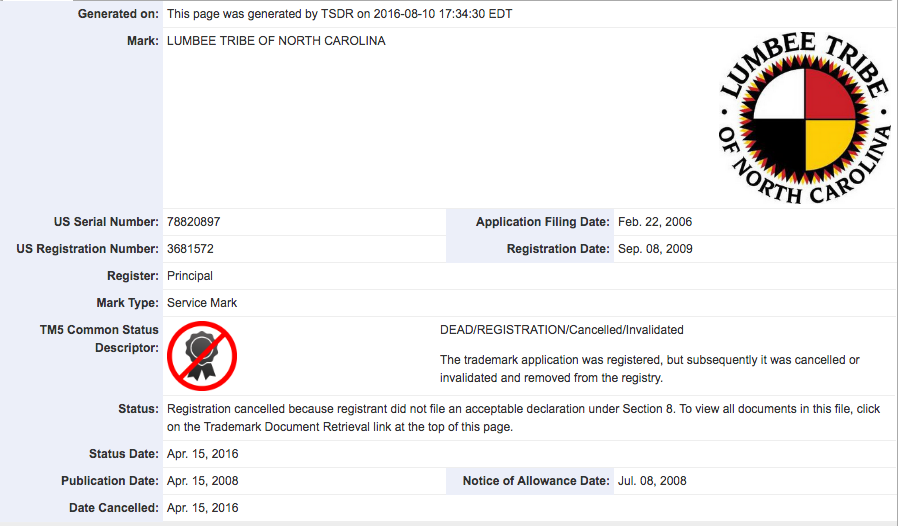The Lumbee Tribe of North Carolina has been successful in coming to a settlement agreement with RA Jeffreys Distributing Co LLC, a distributor of the beer giant Anheuser-Busch LLC, so as to remove offending beer promotions making unauthorised use of the tribes’ marks.
Although the matter was settled out of court, the case provides an example of how indigenous peoples may be able to rely on existing IP and consumer protection regimes to protect and enforce their traditional cultural expressions (TCE) and how brand owners can benefit from promptly responding and showing willingness to resolve such issues.
The Lumbee Tribe
Lumbee is the one of the largest federally recognised Indian tribes in the US with over 55,000 enrolled members. The tribe has an elaborate logo as shown which is symbolic of the Circle of Life and is of tremendous cultural value to the Lumbee people. In 2006, the tribe registered its logo

under US registration number 3681572 in respect of charitable services in class 36.
Unauthorised use of the tribe’s marks
In June this year, Lumbee instituted federal court proceedings against Anheuser-Busch and its distributor RA Jeffreys for making unauthorised use of the tribe’s logo, its name and motto “Heritage, Pride & Strength” in promotional material advertising Budweiser and Bud-Light alcohol products as shown.


Image Source: Lumbee’s complaint filed against Anheuser-Busch and RA Jeffreys
Lumbee alleged in its complaint that the companies’ unauthorised use infringed its trade mark registration and constituted unfair competition and deceptive practices. It contended that the unauthorised use created a false impression of an affiliation between the tribe and Anheuser-Busch and its distributor. It also noted that use of the tribe’s insignia was “offensive because alcohol abuse is often associated with Native American culture”.
Resolution of the dispute
Instituting the court proceedings drew considerable media attention and RA Jeffreys removed the advertising. It issued a formal apology to the tribe assuming responsibility for the advertisement and stating: “RA Jeffreys regrets any offense that may have been taken to the use of the materials in which the Lumbee Tribe claims an interest, and RA Jeffreys will not make any further use of such materials unless specifically permitted to do so by the Lumbee Tribe. RA Jeffreys values and respects the heritage of the communities in which its customers live and work.”
Anheuser-Busch has also issued a statement confirming that it was not involved in making the offending advertisements. It states: “Our wholesalers often implement local marketing efforts on behalf of our brands. The wholesaler responsible for these signs removed them shortly after a complaint was brought to its attention, and has since expressed its regrets. Anheuser-Busch respects the Lumbee Tribe and likewise regrets that this occurred.”
The Lumbee tribe accepted the companies' apologies and the parties have now settled the matter out of court. Although details of the settlement have not been disclosed, as a show of support for the Lumbee tribe, RA Jeffreys has agreed to make a donation for educational and youth programmes run by the Lumbee Land Development Inc, a non-profit organisation that works with the Lumbee tribe.
Twist to the story
Although the matter appears to have been resolved, we note that the Lumbee tribe’s US registration 3681572  was cancelled on 15th April 2016 due to non-lodgement of the declaration of use to support ongoing registration of the mark. It is unclear as to why the registration was not maintained and the extent to which it could have been successfully relied upon in the proceedings.
was cancelled on 15th April 2016 due to non-lodgement of the declaration of use to support ongoing registration of the mark. It is unclear as to why the registration was not maintained and the extent to which it could have been successfully relied upon in the proceedings.

What can we learn from this case?
The case provides important lessons for indigenous communities, brand owners and policy makers:
Need for educating brand owners: In seeking to justify its use of the Lumbee insignia, RA Jeffreys stated that the banners were meant to "honour the rich heritage of the Lumbee Tribe". The case highlights the urgent need to educate to distinguish between cultural appreciation and appropriation.
Brand owners should act promptly and proactively to resolve such issues: Failure to act promptly and proactively when issues of cultural appropriation are brought to their attention could be damaging to brand owner’s business and its brand equity.
Improving access to the legal system: Many tribes lack the financial stability and resources required to secure registration of their trade marks and/or enforce their rights as the Lumbee tribe did. Access to the legal system, therefore, remains a threshold issue if indigenous communities are to rely on the existing legal regimes to protect and enforce their TCE.
Seeking trade mark protection: Where appropriate and feasible, indigenous communities should consider registering their insignia as a trade mark. This may assist in protecting their image and expedite resolution when abuse occurs.
Urgent need for better recognition and protection of TCE: There are limitations within the existing trade mark regime that do not recognise the nature of TCE. For instance, it may not be practicable for indigenous communities to demonstrate ongoing commercial use to maintain the registration in respect of all of the registered goods and/or services. The case reinforces the importance of the international community’s efforts to negotiate an international sui generis legal mechanism to address these gaps.
Marion Heathcote is a partner of Davies Collison Cave in Australia and a member of the MARQUES IP Outer Borders Team. Aparna Watal is an Associate at Davies Collison Cave in Australia.
Find out more about indigenous IP rights on the IP Outer Borders Team page on the MARQUES website and at the dedicated session at the MARQUES Annual Conference at 10 am on Friday 23rd September.
 Issue 068
Issue 068
 Issue 068
Issue 068